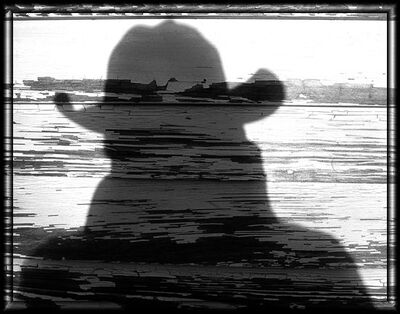Check out Software and Computer Support for Photographers section of our forum.
Lenses of the Next 25 Years
Nov 29, 2015 15:00:12 #
Just got to wondering what are the theoretical possibilities of designing lenses that are small despite large aperture long focal length. Are "plastic" optics possible that fluidly change their optical properties? Might we see a four inch 600mm 2.8 equivalent lens in the imaginable future? Or a 10mm to 600mm all purpose lens that is a fraction of current lens' size? And with current cameras getting close to seeing in the dark, perhaps large aperture lenses will only have relevance to DOF and Bokeh? Just dreaming...I'm 72 and doubt I will witness much change but fun to imagine.
Nov 29, 2015 15:19:26 #
With today's technology I think it more likely that we will be using sensors with huge amounts of pixels, a single focal length lens, and 'zooming' by cropping before you take the shot. With electronic viewfinders, what you see is what you get.
I read an article this morning advocating a shorter lens with higher pixel count over the inverse of that.
But, who knows?
---
I read an article this morning advocating a shorter lens with higher pixel count over the inverse of that.
But, who knows?
---
Nov 29, 2015 15:29:14 #
tinplater wrote:
Just got to wondering what are the theoretical pos... (show quote)
I'm working on a lensless, not pinhole, approach.
--Bob
Check out Astronomical Photography Forum section of our forum.
Nov 29, 2015 15:30:53 #
tinplater wrote:
I'm 72 and doubt I will witness much change but fun to imagine.
Tin, how much have lenses changed since the first time you picked up a camera?
Other than what can be done with electronics, lens properties are mostly just mathematical formulas and glass crystal structure isn't likely to change much.
So rest assured, that when its time for that big, dirt nap, that you and Galileo have pretty much already seen what there is to see!!!!
Now...., camera bodies...., the sky is the limit!
I mean, look at what Samsung was able to achieve just before going Belly-Up!!!!! :lol: :lol:
SS
Nov 29, 2015 15:38:37 #
SharpShooter wrote:
...I mean, look at what Samsung was able to achieve just before going Belly-Up!...
if samsung is going belly up, they sure are keeping it a secret
Nov 29, 2015 16:07:14 #
tinplater wrote:
Just got to wondering what are the theoretical pos... (show quote)
I'm sure that lenses will change a lot. But I also suspect that the processing power of the camera will change a lot and that the camera will compensate for shortcomings of the lens in ways we can't yet imagine. SW people are just now venturing into the deconvolution world and it can do some incredible stuff. But it also taxes the fastest PCs to make it painless. Once the computational capability to do this kind of stuff right in the camera, who knows where it will go. So basically, what I would expect is that the camera knows the faults of the lens and reconstructs the image into something that might be obtained with a physically impossible "perfect" lens.
In the early 80's, my first PC ran with a clock speed of, I think was, 4.83 MHz. Today, I am using an 8 core with a clock speed of 3.4 GHz. And considering how much more this PC can do with 64-bits and 8 cores compared to less than 5 MHz and 1 core, there is more than a thousand fold increase in speed.
And cameras have benefitted from this also.
And the real benefits are still to come.
Nov 29, 2015 17:31:46 #
JimH123 wrote:
...And cameras have benefitted from this also.
And the real benefits are still to come.
And the real benefits are still to come.
There is a downside to all them electronic thingies; right now my $450 canon flash is dead in the water cause i needed its $1 batteries to run my mouse.
Check out Panorama section of our forum.
Nov 29, 2015 17:35:48 #
oldtigger wrote:
There is a downside to all them electronic thingies; right now my $450 canon flash is dead in the water cause i needed its $1 batteries to run my mouse.
You are clearly spending too much on batteries...
Nov 29, 2015 17:45:43 #
tinplater wrote:
Just got to wondering what are the theoretical pos... (show quote)
Check out the topic-
*7 camera features you will see before you die* In the links section.
and read about liquid lenses.
Nov 29, 2015 17:52:54 #
Bill_de wrote:
I'm glad this Topic was posted! Although I'm a science fiction fan, I rarely speculate on future technology. But I have studied a bit about its evolution. The "Brute Force" approach (e.g. more pixels per square inch,) can only go so far in advancing any particular technology. I agree with Bill's prediction that further tweaking of the current approach to visible light photography will be by increasing pixel density such that "digital zooming" with one heckuva normal lens will be possible instead of employing a telephoto lens.With today's technology I think it more likely that we will be using sensors with huge amounts of pixels, a single focal length lens, and 'zooming' by cropping before you take the shot. With electronic viewfinders, what you see is what you get.
I read an article this morning advocating a shorter lens with higher pixel count over the inverse of that ...
I read an article this morning advocating a shorter lens with higher pixel count over the inverse of that ...
But, alas, there is the ever-present ART OF PHOTOGRAPHY! Outside of say, news photographers, the artistic side of us likes the distortion effects of wide angle and telephoto lenses. Then, of course, PERSPECTIVE can play a role in this Art. Those who employ only prime lenses remind us not to forget using our own two feet!
Every so often, a new approach will develop that with improvements in allied technologies results in a great leap; no, let's not call it "a quantum leap." :wink: The development of the CT scanner (and later NMR Imaging) for medical use evolved from theories that required a certain amount of computing power to become practical for scanning human beings, as opposed to corpses (6-9 hours) and sedated rats (3-6) hours.
SO HERE'S MY PREDICTION: Digital Light Ray Imaging! ... and the associated type of lens that will be required to optimize resolution.
Yes, I am indeed referring to what currently looks like a loser: that imaging approach used by LYTRO to make that camera called the Illium, that originally retailed for $1600, cut to $600 a couple of months ago, and just reduced last week (@ B&H) to $460. That model is what I'd call a Not-Ready-For-Prime Time camera because the net projected image is only about 4 MP, which is next to nothing by today's standards.
So what's so great about the idea? Because one can retrospectively "refocus" the image data to obtain an image with a different focus of interest! I view this as quite analogous to the progressive development of MRI.
Writing speculatively (as I am ignorant of the specifics,) in terms of principles, I believe the LYTRO Illium is failing market-wise due to a combination of its limited resolution (in terms of the # of different light rays collected,) the processing speed and perhaps the mathematical approach employed to make those calculations, and perhaps the limitations of current materials available. This technology is in its infancy. Using the CT scanner analogy, I believe that the current state of this "light ray" technology is probably akin to when CT scans could only be done on corpses.
No, I have absolutely no affiliation with LYTRO or any of its people. If I weren't the kind of person who only buys stocks via ETF's and Mutual Funds, I'd consider buying stock in that company, if it exists.
lev29 😎
Nov 29, 2015 18:37:12 #
My guess will be faster lenses, sharper images, and lighter and shorter and hopefully less expensive. I am senior also and doubt I will see those dreams come true. I enjoy what I have and can buy.
tinplater wrote:
Just got to wondering what are the theoretical pos... (show quote)
Check out Astronomical Photography Forum section of our forum.
Nov 29, 2015 19:20:14 #
Bill_de wrote:
With today's technology I think it more likely that we will be using sensors with huge amounts of pixels, a single focal length lens, and 'zooming' by cropping before you take the shot. With electronic viewfinders, what you see is what you get.
I read an article this morning advocating a shorter lens with higher pixel count over the inverse of that.
But, who knows?
---
I read an article this morning advocating a shorter lens with higher pixel count over the inverse of that.
But, who knows?
---
But, who knows? Maybe you do. This is the third mention in a week I've seen with offhand discussions of cropping down to an arbitrary field of view (FoV).
The first mention was a fleeting mention by an educator discussing large numbers of pixels; he crops in post already; I think he actually said more pixels is a way to reduce how many lenses you need.
The second mention was on UHH last week.
Since I've not seen anyone try to advance the discussion, I will:
If a prime can serve here, as noted above, then zoom lenses have less utility or an alternative arises to some zoom functionality. Zooms generally have more glass, introducing more opportunity for negative side effects such as flattening perceived depth. It is a little harder to understand what zooms do, because optical effects can arise more at the extremes and because the effective aperture may not be constant as set for all zoom settings.
On the other hand, some photography understanding is needed for crop-to-FoV. For example, what in the scene are you exposing for is best decided before the shot, and you might need to know how to handle topics that are rarely front-and-center, like locking auto exposure while you recompose.
Likewise, crop-to-FoV may require thinking through focus mode, AF-area mode, and metering mode, to understand when crop-to-FoV can be a fit.
It strikes me that crop-to-FoV could happen now in post in the manner discussed by the educator as I mentioned, above. Crop-to-FoV also could happen in another way going forward, as noted by Bill_de here. As I extrapolate from what I read here, there might one day be a crop-to-FoV preview display at the end of framing. As a detailed, practical example, consider an immobile subject. You might preview the final crop-to-FoV framing just before shutter release with exposure and focus locked.
Finally, I'd see crop-to-FoV blossoming in mobile phones while squeezing the DSLR world. It seems to me that phone makers would have motivation to implement this that the makers of dedicated cameras might not have.
Oh, and pardon my being out on a limb here.
Nov 29, 2015 19:40:14 #
The laws of Physics will dictate just how many pixels can be crammed onto a sensor. We already know the impact of diffraction on setting the f-stop to too high a number, and this is limited by the size of the sensor.
At some point, more pixels isn't going to do it anymore.
I still think that serious computation in the camera to get around the limitations of the lens and sensor is where its going to go. And if that camera can compute at over 1000x times faster than todays cameras, then there's a whole lot of computing it can do in what will seem like real time.
At some point, more pixels isn't going to do it anymore.
I still think that serious computation in the camera to get around the limitations of the lens and sensor is where its going to go. And if that camera can compute at over 1000x times faster than todays cameras, then there's a whole lot of computing it can do in what will seem like real time.
Nov 29, 2015 19:41:49 #
oldtigger wrote:
if samsung is going belly up, they sure are keeping it a secret
http://www.diyphotography.net/more-reports-of-samsung-shutting-down-its-camera-business/
Nov 29, 2015 21:35:03 #
JimH123 wrote:
PRECISELY! Like I wrote, there's only so far the Brute Force approach can go! :mrgreen:The laws of Physics will dictate just how many pixels can be crammed onto a sensor. We already know the impact of diffraction on setting the f-stop to too high a number, and this is limited by the size of the sensor ...
If you want to reply, then register here. Registration is free and your account is created instantly, so you can post right away.









